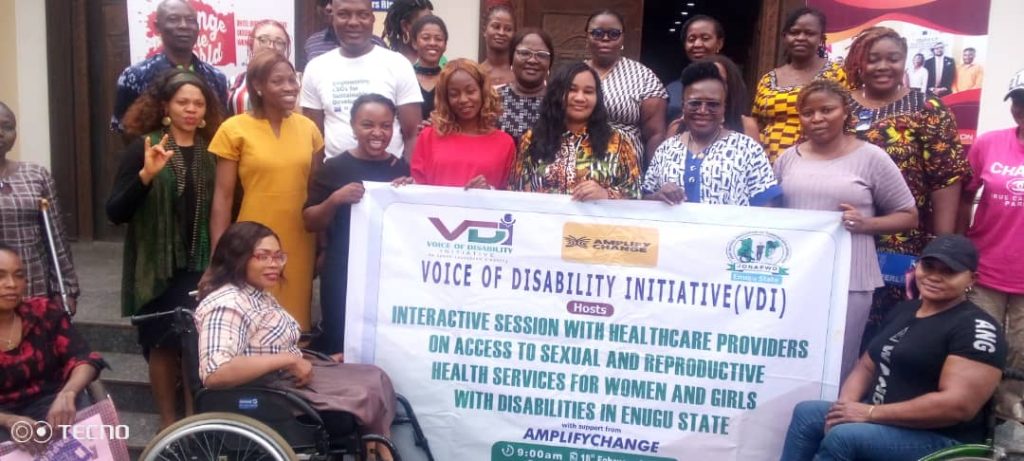Ben Ezechime, Enugu
A Non-Governmental Organisation (NGO), Voice of Disability Initiative (VDI), has appealed to the Enugu State Government to provide Persons With Disabilities (PWDs) access to sexual and reproductive needs.
Mrs Catherine Edeh, VDI Executive Director, who stated this during a workshop in Enugu, listed such needs as contraceptives, condoms and family planning.
The group also decried discrimination against PWDs especially women and girls in accessing healthcare services in many hospitals in the state.
The workshop was entitled, “Interactive Session with Healthcare Providers on Access to Sexual and Reproductive Health Services For Women and Girls With Disabilities in Enugu State.”
It was organised by VDI in collaboration with the Joint National Association of Persons with Disabilities (JONAPWD), Enugu Chapter.
Edeh said that the workshop would provide the team with the opportunity to interact with medical professionals in the state regarding inclusion and how to assist women in accessing medical facilities.
She said the workshop would also increase the understanding of the women and girls about their sexual and reproductive health.
“We have medical professionals from different public hospitals and health centres.
“Our duty is to inform them on how to bridge the gap and help them connect more with our disability community.
“Our women are here sharing their experience and plight. The whole idea is to know how to address them appropriately.
“Also to understand us more so that together we can push for inclusive health for women and girls with disabilities.”
She lamented the absence of critical stakeholders at the workshop saying it is painful and this is more pronounced in the South-East.
“In the North, when we have a project like this, you will see up to four commissioners in attendance and those who cannot come send representatives.
“There is no way we can connect well without the participation of the Ministry of Health.
“So I am appealing to the state government to give us a listening ear to achieve inclusion in Enugu State.”
Edeh said the project was being sponsored and supported by Amplify Change, the implementing partner in the United Kingdom.
Mr Edward Ogenyi, a facilitator of the programme, said the workshop would be carried out in three states, which include Ebonyi, Enugu and Kwara.
According to him, through Amplify Change support, VDI was able to push for disability laws in Enugu State which came into effect in 2023.
“We are here today because of the successes recorded by VDI, and Amplify Change is supporting this workshop, and we hope to expand the project to other states in Nigeria,” Ogenyi said.
Onyinye Mamah, Executive Director, Heroine Women Foundation, highlighted that Enugu scored low in sexual and reproductive health for women and girls with disabilities, especially in accessibility, contraceptive availability, and employability.
Mamah emphasised that PWDs should be viewed through a lens of humanity, not charity, and should be treated like anyone else seeking medical care at the hospital.
Ms Susan Ihuoma, a Gender and Social Inclusion Advocate, said women and girls with disabilities had the right to quality sexual and reproductive services.
Ihuoma spoke on the topic “Addressing Barriers and Strengthening Networks for Women and Girls With Disabilities.”
She said that 70 per cent of health centres in Enugu were not wheelchair accessible and lacked ramps, sign language interpreters and toilets.
Ihuoma added that 28 per cent of women in Nigeria experience sexual violence but were afraid to seek help due to stigma.
“It is our right to access family planning and contraceptives, maternity and child care, information about menstrual health and protection against Gender-Based violence,” she said.
Victoria Nneji, a PWD, who shared her experience, said she was not given the opportunity to choose between vaginal delivery and a caesarian section when she was pregnant.
VDI is a women-led, wholly Nigerian Organisation of PWDs that undertakes advocacy and civic actions, including direct litigations on behalf of women, girls, and children with disabilities.

